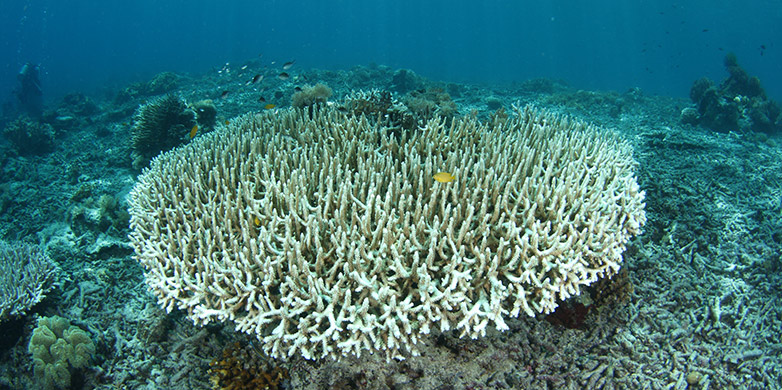Blanching in the light of a breakup
Coral reefs are vibrant partnerships of corals, microalgae, and bacteria. Apply a little heat, and this community breaks down as the symbiotic algae leave, turning corals pale. On a political level, the Brexit is teaching us the value of partnerships, but the UK’s experience is but a small ripple as compared to that of the world’s coral reefs.
The run-up to the European referendum in the United Kingdom reached fever pitch last month, with heated debates among the protagonists. The end result, as we are all too aware, was that the UK decided to leave the European Union. No doubt the trading links between the EU and UK are too strong for any lasting economic damage, but I suspect that the UK will be a pale shadow of what it was before the referendum.
Partnerships can be rocky, even tumultuous, but they are invariably more successful than groups of separate and mutually suspicious entities. Aesop, of course, well recognised this in his fable The Four Oxen and the Lion. Niccolò Machiavelli too recognised this well, arguing in The Art of War that a captain should use every opportunity to divide his enemies and set them against each other. Divide ut regnes was used effectively by Julius Caesar against the Gauls, and as a strategy has proven its worth many times since. The converse “United we stand, divided we fall” has proved a rallying cry for those threatened by oppressors. Nonetheless, the referendum is history, and the future is uncertain. The possible consequences of the United Kingdom’s withdrawal will, however, be as nothing to that of another great ruction in a partnership that has, until recent years, long stood the test of time.
Divided we fall
We have just experienced the longest and largest global coral bleaching event on record. Tropical sea surface temperatures over the past year have been alarmingly high. Under such circumstances, corals lose their symbiotic microalgae (zooxanthellae) which lend corals their bright colours. More than just colours, the zooxanthellae provide corals with most of their organic carbon, secured through algal photosynthesis. But the coral-algae symbiosis cannot tolerate high water temperatures, and zooxanthellae are expunged from the coral structure at such times, leaving behind a pale shadow of what existed before. These events, which have been larger and more frequent in recent decades, result in higher rates of coral death and greatly reduced growth of the corals that survive.
Coral communities are not restricted to partnerships with zooxanthellae. The skeleton and tissues of corals contain large populations of microalgae, bacteria and archaea, as do the mucus layers that surround the tissues. This microbiota plays an important role in maintaining the health of coral reefs. There are bacteria that fix nitrogen, providing around half of the nitrogen needs of the coral. Other bacteria decompose wastes.
United we stand?
Recovery of corals from the latest bleaching episode is possible, after a decade or so, as long as bleaching does not last too long and is not quickly followed by a similar episode. Shocking as it is to see bountiful and beautiful coral reefs transformed into ghostly silhouettes almost devoid of life, the bleached corals do, nonetheless, remain alive, at least for a while. Indeed, since the end of the last glacial period, around 15,000 years ago, there have been repeated abrupt changes in temperature during which sea surface temperatures climbed steeply over the course of 100 to 1000 years. Reefs continued to grow throughout these episodes, and if there was any coral bleaching, the corals clearly recovered rapidly.
The situation is, however, a little different now. To begin with, seas were cooler in the postglacial environment. Moreover, warming now is accompanied by a rapid climb in atmospheric carbon dioxide which acidifies oceans and dissolves calcium carbonate, the very structure that corals are made of. Pollution and heavy sediment deposition from onshore farming and industrial activities create further stress. Over-fishing reduces the number of fish that graze on macroalgae, allowing macroalgae to expand and smother corals.
In spite of these multiple threats, it turns out that the coral community, including its complement of zooxanthellae, bacteria, and archaea, might be far more adaptable than initially thought. Such a community of partners might be able to reconfigure itself to cope with, or adapt to, environmental stresses. This idea proposes that the coral-microbial community can adapt to change far more rapidly than any genetically-based adaptation. Yet we know too little about how this complex biological community functions to be able to say with any certainty whether corals will weather the storm of human impacts.
Bleaching and Brexit
Coral reefs and the UK have much in common. They both occupy a tiny part of the world’s oceans and yet support a great deal of diversity (biological for coral reefs, human and cultural for the UK). Over 450 million people live near to, and benefit from, coral reefs, and a similar number live in the EU, near to, and benefitting from, the UK. When things heat up, zooxanthellae expel themselves from a productive partnership with the wider community. It appears that the UK does the same. Given time, the complex community that comprises a coral reef, or for that matter the UK and EU, might well recover by adjusting itself to cope with new threats and challenges.
There is, however, one crucial difference. The worst that the UK and EU are likely to suffer is a period of uncertainty, and perhaps even economic recession. For coral reefs, a failure to stand united as a community in the face of environmental challenges could well be more terminal. A failure to recover spells extinction – not only for corals, but also for much of the estimated 25% of the world’s marine life that calls coral reefs home.

Comments
No comments yet